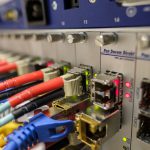
Introduction
For high-tech industries involved in the production of quality products, product quality, safety, and compliance with specific industry standards are paramount. To ensure the strength and optimised functionality of components, force gauges play a critical role in various sectors. But what exactly they are? Which one should be used and when: digital or mechanical force gauge? This article examines the intricacies of force gauges, comparing the traditional mechanical models with their advanced digital counterparts to help you choose the right one for your needs.
What are Force Gauges? Exploring Their Significance in Multiple Industries
They are also called force meters, are specialised instruments used to measure force exerted on an object. The measured magnitude of forces can be either push (compression) or pull (tension) forces that output in pounds, kilograms, and newtons. A force gauge converts the applied force into a measurable quantity, which is then displayed on a dial or digital screen. Using these force measurement tools offers unparalleled benefits in terms of easy operations, ergonomics, portability, and precision, making them ideal for various applications in multiple fields.
Force gauges play a pivotal role in various sectors. In manufacturing, they help ensure that products meet specified force requirements. In laboratories, they are used in material testing to evaluate the strength of materials. They are also vital in ensuring compliance with safety regulations by verifying that tools and machinery operate within safe force limits.
An Insight Into the Most Popular Types: Mechanical & Digital
Force gauges are classified into various types based on their output formats, operating systems, and intended applications. Among the hydraulic, pneumatic, strain gauge load cells, and capacitive force gauges, the mechanical and digital models are the most commonly used force meters.
Mechanical Force Gauges: A Brief Overview
They are also called analogue force gauges, are simple, reliable measurement tools designed to measure force by utilising a spring mechanism. They are portable, durable, and require no batteries to operate, making them ideal for situations where electrical power is unavailable. A mechanical force gauge uses mechanical components to measure forces where the applied force causes a pointer to move on a scale, providing a direct reading.
An Overview of Digital Force Gauges
Unlike analogue models, digital force gauges use electronic components to measure force. They offer high precision, easy readability, digital readout, and the ability to measure peak forces. A digital force gauge comes with advanced features such as data storage, USB connectivity, and auto-calibration. With built-in advanced electronic sensors and microprocessors, digital force meters are invaluable in research and quality control applications in various settings.
Specialty Force Gauges: Beyond Standard Force Meters
Specialty or specialised force gauges are precision instruments designed for specific applications, such as peel testing, torque measurement, or specialized material testing. These gauges may incorporate unique designs or sensors tailored to their particular use case and requirements. Specialty force gauges may be tailored for extreme environments, specific force ranges, and high-resolution measurements, ensuring optimal performance and reliability in diverse fields.
Digital vs. Mechanical Force Gauges: A Comparative Analysis
The choice between a mechanical and digital force gauge mainly depends on the specific requirements of your application. The primary difference between these versatile instruments lies in how they measure and display force. Let’s compare their differences to help you decide on a suitable tool for your needs.
Differences Based on Accuracy and Precision
They offer superior accuracy compared to mechanical models, especially at lower force levels. While mechanical gauges are adequate for many applications, the precision of digital gauges makes them the preferred choice in situations requiring exact measurements.
Variations On the Basis of Ease of Use and Calibration
Digital gauges are easier to read and often come pre-calibrated from the factory. However, they do require regular recalibration to maintain accuracy. Mechanical gauges, on the other hand, are simple to use but require careful reading and interpretation.
Durability and Maintenance Differences
Mechanical gauges are known for their durability and low maintenance requirements. Digital gauges, while more sensitive and less rugged, provide years of reliable service with proper care and regular calibration.
Distinctions Based on Cost
They are typically more affordable, making them a good option for applications where budget is a concern. Digital force gauges, while more expensive, offer features that can justify the higher cost, especially in professional or industrial settings.
Application-Specific Comparison
A mechanical force gauge may suffice for basic applications. However, a digital force gauge is recommended for tasks requiring high precision or data analysis.
Final Thoughts
Force gauges are indispensable tools across many industries, offering critical insights into the forces at play in various processes. Choosing between a digital and mechanical force gauge depends mainly on your specific needs, budget, and the environment in which the gauge will be used. While mechanical gauges provide a cost-effective and durable option, digital force gauges offer superior precision and advanced features.





















